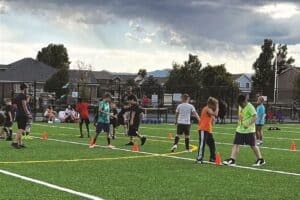On May 13, Sandra Martin, president of Protect Our Wells, El Paso County’s only private well owner advocacy group, gave a presentation to the Arkansas Basin Roundtable in Pueblo in support of POW’s application for a grant to monitor water levels in wells in El Paso County and a small part of Elbert County.Roundtable members voted to deny funding for POW’s aquifer monitoring program.POW sought $50,000 from the Arkansas roundtable, $20,000 from the Denver Metro roundtable and $150,000 from the state, for a total of $220,000. The money would have been used to drill and monitor 12 wells and also monitor 25 existing wells for a three-year period, after which the state would assume monitoring.Hydrogeologist and POW consultant Julia Murphy presented technical information about the monitoring program.Murphy said only 10 wells are being monitored in the four Denver Basin aquifers under the proposed 1,300-square-mile study area: three in the Dawson, six in the Denver, none in the Arapahoe and one in the Laramie-Fox Hills.For the most part, El Paso County, including the Falcon area, relies on Denver Basin aquifers for water.”These aquifers are non-renewable,” Murphy said. “We know depletions are occurring in the Castle Rock area. There are 26,000 private and large capacity wells in El Paso County. By 2030, it’s projected we’ll have over 100,000 wells. There are already 80,000 new homes approved for this area. It’s imperative that we start managing this resource properly.”Before voting on POW’s monitoring program, roundtable members discussed the program’s problems.One roundtable member asked if POW had asked the commissioners of Elbert and El Paso counties to participate in the study. “Those people issue new building permits, so they should be part of the study so they can understand the results,” he said.”We approached El Paso County with a similar monitoring program. They very much supported the concept but didn’t have the funding, and they have less funding now than when we first approached them,” Murphy said.”How many actual well [owners] are in the POW organization?,” asked one roundtable member.Martin said POW’s membership is fairly low. “POW is typical of any other advocacy group. We advocate for all private well owners. It’s much like public television,” she said. “A lot of people watch it and never contribute, but they get the benefit of it. As it [water] becomes more critical, you can bet that the membership is going to grow.” She estimated that POW has 300 members.”I sure have a problem with an organization that represents 300 people out of 26,000 wells getting this kind of money,” said roundtable member Tom Young. “You’re talking about less than $10 per well to fund the whole thing.”Jeris Danielson, Interbasin Compact Committee representative to the roundtable, criticized POW for not putting any of their own money into the study.Danielson also objected to the lack of participation by county government and the groundwater management districts (Upper Black Squirrel and Upper Big Sandy) in the proposed study area.”I am absolutely opposed to spending roundtable basin money for this, particularly when there is no skin in the game,” Danielson said.Murphy said no funds are available from the groundwater management districts because they are preparing state-mandated water budgets and are likely to seek grants from the roundtable to fund those efforts.Another roundtable member said it’s up to private well owners to do their own monitoring. “We’ve been monitoring wells in the Upper Arkansas Valley, partnered with the United States Geological Survey for the last 20 years. I’m against letting any money go for this project,” he said.SeEtta Moss, roundtable vice chair, suggested that POW seek full state funding.”They [El Paso County] put themselves into this ditch because they don’t want to regulate. But we all live in the basin together,” Moss said. “They are going to come and get our water. Let’s find out what the situation is before we’re all sunk. Let’s fund the program out of state funds.”Young advised the applicants to ask the county planning commission to consider stopping growth. “Some limits have to be placed somewhere, somehow, sometime. When you have a finite resource, eventually it is going to run out,” he said.”If you don’t have data showing that depletions are occurring, the interpretation is that there’s not a problem,” Murphy said. “Counties, including El Paso County, will continue to approve development based on the standards they’ve used in the past because they don’t see a problem. They don’t see a problem because there is no data.”
They [El Paso County] put themselves into this ditch because they don’t want to regulate.– SeEtta Moss,roundtable vice chair
After the vote, Martin said POW would continue to seek funding for the program.”We are approaching the roundtables and state for funding because water providers are taking most of the water from these aquifers – not private wells,” Martin said.The Arkansas roundtable is one of nine roundtables established in 2005 to “facilitate discussions on water management issues and encourage locally driven collaborative solutions,” according to the IBCC Web site, ibcc.state.co.us.With the exception of the Metro roundtable, which covers the Denver metropolitan area, each roundtable corresponds to a river drainage system. El Paso County is located in the Arkansas Basin and; therefore, within the area covered by the Arkansas roundtable.For more information about POW’s proposed study, visit www.ProtectOurWells.org.







